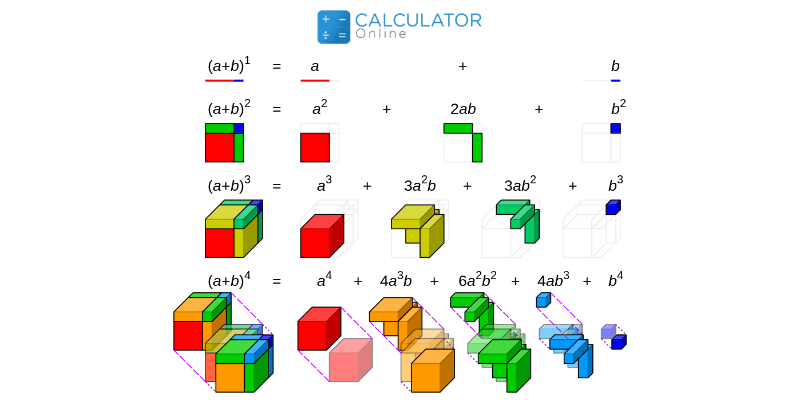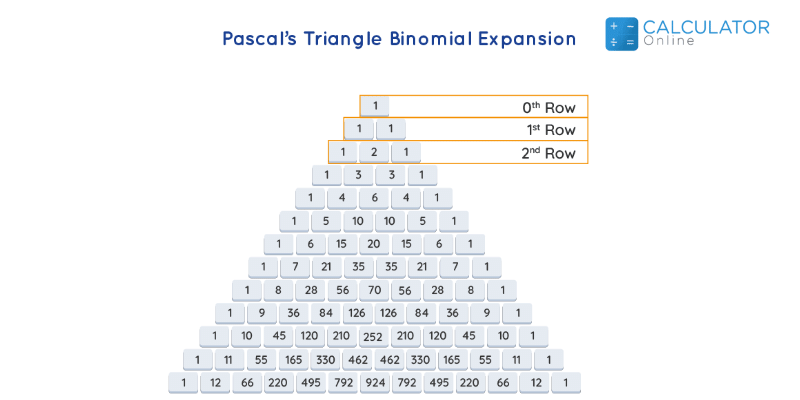Adblocker Detected

We always struggled to serve you with the best online calculations, thus, there's a humble request to either disable the AD blocker or go with premium plans to use the AD-Free version for calculators.
Disable your Adblocker and refresh your web page 😊
Table of Content
The Binomial Coefficient Calculator helps to find the binomial coefficient C(n,k) of two given natural numbers “n” and “k”.
In algebra, a polynomial having two terms is called the binomial, these two terms can be separated by the plus or minus symbols.
“The binomial coefficient C (n, k) is the number of ways of picking “k” unordered possibilities or outcomes from the” possibilities”.
These possibilities are also known as the combination regardless of their symmetry. The binomial coefficient calculator provides us with information about all the possible combinations.The binomial coefficients are used to find the number of possible ways the combination can write the expression.It counts various ways of grouping an unordered collection of items (k) from a total set of items (n), and we can find all the possible combinations by the binomial theorem expansion calculator.
The binomial coefficient formula is as follows:
$$ \binom{n}{k} = \dfrac{n!}{k!(n-k)!} $$

Consider, we have n=3, and k=2, then the number of all the possibilities or the combination can be calculated as follows:
Solution:
n = 3, k = 2
$$ \dbinom{3}{2} = \dfrac{3!}{2!(3-2)!} $$
$$ \dbinom{3}{2} = \dfrac{3!}{2!(1)!} $$
$$ \dbinom{3}{2} = \dfrac{6}{2(1)}$$
$$ \dbinom{3}{2} = \dfrac{6}{2}$$
$$ \dbinom{3}{2} = 3$$
Binomial coefficient=3
It is impossible to understand the binomial coefficient concept,without learning about factorial.
The factorial of a natural number “n” is donated by the “n!” and the product of all the natural numbers less than or equal to “n”.
Consider, we want to write the “7 !”, then we can write it as follows:
7 ! = 7 * 6 * 5 * 4 * 3 * 2 * 1
7 ! = 5040
It can be difficult to find the factorial of larger terms like 49! or 37!, but we can utilize the factorial calculator for the larger terms. The numerical coefficient calculator finds all the combination values normally in a matter of seconds.
The Pascal triangle is a simple way to find the coefficient of the binomial expansion. You can evaluate the given binomial coefficient by the pascal triangle in a matter of seconds. Pascal’s triangle is a handy way to readily verify if the binomial expansion of the given polynomial is done correctly or not.
The generalized formula for the Pascal’s Triangle to find the binomial coefficient are as follows:
(x+y)n = a0 xn y0+ a1 xn-1 y1 + a2 xn-2 y2 + … + an x0 yn

You can find the solution of every binomial coefficient in the Pascal triangle. You can construct any binomial coefficient formula by Pascal’s triangle.
Consider the expansion below:
(x+y)2 = x2 + 2xy + y2.
If we are going to write all the hidden terms and the coefficients of this expansion, then we can write:
x2 + 2xy + y2 = 1×2 y0+ 2x1y1 + 1x0y2.
When we see the coefficients, then these are 1,2,1, then we can find this binomial expansion in the second row of Pascal’s triangle. This exact match of the coefficients of the terms in the expansion of (x+y)2. Now if we take the binomial expansion of the polynomial (x+y)n, Then we have the following expression.
Find the binomial coefficient by Pascal’s triangle, which can be used to find the combination by the binomial expansion coefficient calculator. Calculate binomial coefficients and find all the possible combinations by the binomial coefficient. Determine the constant that should be added to the binomial calculator to find all the possible combinations.
The Newton’s binomial Theory is used to calculate the coefficient of the polynomial raised to the power “n” in a most simple way. We can find the number of possible combination directly by the Newton’s binomial Theory
Find the coefficient of the x^4y^2 in the expansion (x+y)^6.
$$ \text {coef} (x^4y^2) =\dbinom {6} {4} =\dfrac {6!} {4! \, 2!} = 15 $$
We can find the coefficient rather than expanding (x+y)^6, as it can be tedious for us,but you can find the binomial theorem coefficient calculator to find all the possible terms.
The same way, we can find the coefficient of the following terms by Newton’s binomial coefficient theory.
$$ \text {coef} (x^6) =\dbinom {6} {6} =\dfrac {6!} {6! \, 0!} = 1 $$
$$ \text {coef} (x^5y) =\dbinom {6} {5} =\dfrac {6!} {5! \, 1!} = 6 $$
$$ \text {coef} (x^4y^2) =\dbinom {6} {4} =\dfrac {6!} {4! \, 2!} = 15 $$
We have already calculated the values of x^4y^2 above.
$$ \text {coef} (x^3y^3) =\dbinom {6} {3} =\dfrac {6!} {3! \, 3!} = 20 $$
$$ \text {coef} (x^3y^3) =\dbinom {6} {3} =\dfrac {6!} {3! \, 3!} = 20 $$
$$ \text {coef} (x^2y^4) =\dbinom {6} {2} =\dfrac {6!} {2! \, 4!} = 15 $$
$$ \text {coef} (xy^5) =\dbinom {6} {1} =\dfrac {6!} {1! \, 5!} = 6 $$
$$ \text {coef} (y^6) =\dbinom {6} {0} =\dfrac {6!} {0! \, 6!} = 1 $$
There the (x+y)^6, can be deducted by the binomial coefficient calculator:
$$ (x+y)^6=x^6+6x^5y+15x^4y^2+20x^3y^3+15x^2y^4+6xy^5+y^6 $$
The binomial coefficient formula is simply implemented by Newton’s binomial theory, and we don’t need to implement the whole binomial formula on the algebraic function.
The binomial factor calculator requires simple input values:
Input:
Output:
The binomial coefficient calculator generates the following result:
The binomial probability describes the probability of getting the exact probable result. For example, what is the probability of 2 heads in 3 coin tosses? Find the coefficient a of the term in the expansion by the binomial theorem expansion calculator and binomial expression and find the probable result.
The binomial expression is an algebraic term having two terms, these terms can be separated by the addition or subtraction signs.Evaluate binomial coefficient and find all the possible combinations of the algebraic terms.The numerical coefficient calculator assists to find all the possible combinations.
The formula to find the expansion of a binomial is (a + b)^n = ∑nk=0 (n k) an – k bk, where (n k) = n!/[(n – k)! k!] and n! = 1 . 2 . 3 … n.The binomial-theorem-calculator should be used to find the binomial expansion of any algebraic function. Expanding binomial calculator makes it easy to expand any binomial function.
The binomial coefficient is primarily used to count the probability calculations. The main purpose to evaluate binomial coefficients is to find the maximum number of the combination of “k” elements out of “n”. The expanding binomial calculator can be used to find all the possible combinations, in the following example, there are 1906884 combinations possible for given values of “k” elements out of “n”.Use the binomial solver for finding solutions of larger binomial terms.
$$ \dbinom{49}{5} =1906884} $$
The binomial coefficient is much more than a simple formula, it provides you with all the possible combinations of the “k” elements that can be chosen from a set of “n” elements. The binomial coefficient calculator can implement the binomial coefficient formula in the most efficient way. For finding simplicity, you can use Pascal’s triangle and Newton’s theory to find all the possible combinations.
From the source of statisticshowto.com:Binomial Coefficient,the importance of the Binomial Coefficient in Statistics
From the source of whitman.edu:Binomial Coefficient, Examples